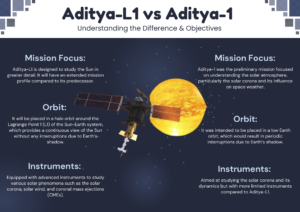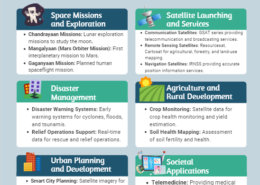Examine critically the moral and legal ramifications of using heavenly bodies’ in-situ resources and the necessity of global governing structures.
Aditya-L1 is a significant advancement over its predecessor, Aditya-1. Here’s how they differ and the scientific objectives of Aditya-L1: Differences Between Aditya-L1 and Aditya-1: Mission Scope and Payloads: Aditya-1: Originally planned to be a dedicated mission to study the solar corona, Aditya-1Read more

Aditya-L1 is a significant advancement over its predecessor, Aditya-1. Here’s how they differ and the scientific objectives of Aditya-L1:
Differences Between Aditya-L1 and Aditya-1:
- Mission Scope and Payloads:
- Aditya-1: Originally planned to be a dedicated mission to study the solar corona, Aditya-1 was designed with a single payload—the Visible Emission Line Coronagraph (VELC). Its primary focus was to capture images of the solar corona and study its dynamics.
- Aditya-L1: Aditya-L1 is an extended and enhanced version of the original mission. It carries multiple payloads to study various aspects of the Sun. While it still includes the VELC, it also incorporates other instruments to observe the solar atmosphere, solar wind, and the impact of solar activity on the Earth’s environment.
- Orbital Position:
- Aditya-1: Planned to be in a low-Earth orbit.
- Aditya-L1: Will be placed in a Lagrange Point 1 (L1) orbit, which is a stable point between the Earth and the Sun. This location provides a continuous view of the Sun without any interference from the Earth or Moon.
- Mission Duration and Coverage:
- Aditya-1: Designed for a limited mission duration and scope.
- Aditya-L1: Aims for a longer mission duration with comprehensive coverage of various solar phenomena due to its strategic position at L1.
Scientific Objectives of Aditya-L1:
- Study of the Solar Corona: To observe the outermost layer of the Sun’s atmosphere and understand its heating mechanisms, solar wind acceleration, and coronal mass ejections.
- Solar Activity and Space Weather: To investigate solar activities such as solar flares and their impact on space weather, including geomagnetic storms and their effects on Earth’s magnetosphere.
- Dynamics of the Solar Atmosphere: To analyze the solar atmosphere’s dynamics and the interactions between different layers, including the photosphere, chromosphere, and corona.
- Solar Wind Studies: To measure the properties of the solar wind and its influence on the Earth’s space environment.
- Connection Between Solar Activity and Geomagnetic Effects: To explore the link between solar phenomena and their effects on the Earth’s magnetic field and ionosphere.
Overall, Aditya-L1 aims to provide a holistic understanding of solar activities and their influence on space weather, which is crucial for predicting space weather events and their potential impact on technological systems and daily life on Earth.
See less


The exploitation of in-situ resources on celestial bodies such as the Moon and asteroids raises several ethical and legal challenges that necessitate robust international governance frameworks. Here’s a critical examination of these issues: **1. Ethical Challenges **a. Equitable Access and ResourceRead more
The exploitation of in-situ resources on celestial bodies such as the Moon and asteroids raises several ethical and legal challenges that necessitate robust international governance frameworks. Here’s a critical examination of these issues:
**1. Ethical Challenges
**a. Equitable Access and Resource Utilization
Overview:
Ethical Concerns:
Examples:
**b. Impact on Future Generations
Overview:
Ethical Concerns:
Examples:
**2. Legal Challenges
**a. Legal Frameworks and Ownership
Overview:
Legal Issues:
Examples:
**b. International Collaboration and Disputes
Overview:
Legal Issues:
Examples:
**3. International Governance Frameworks
**a. Need for Comprehensive Regulations
Overview:
Recommendations:
Examples:
**b. Promoting Collaborative Approaches
Overview:
Recommendations:
Examples:
Conclusion
The ethical and legal challenges surrounding the exploitation of in-situ resources on celestial bodies require careful consideration and the development of robust international governance frameworks. Addressing these challenges involves creating comprehensive regulations that ensure equitable access, sustainable practices, and effective dispute resolution. By promoting international collaboration and establishing clear legal frameworks, the global community can ensure that the benefits of space resource utilization are shared fairly and responsibly.
See less